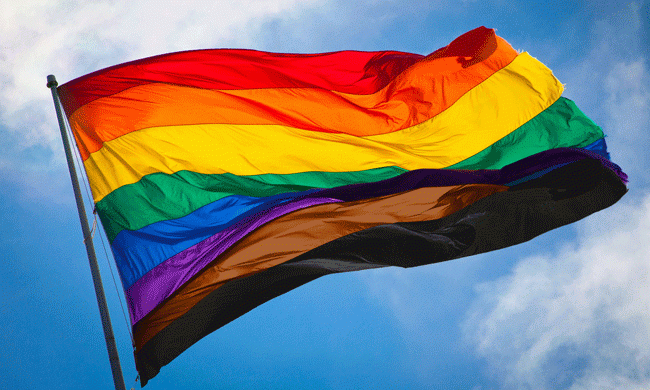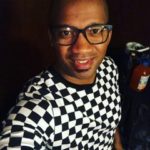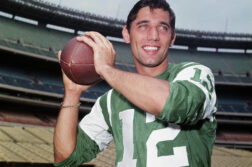
DEE DEE WAS 22. A mocha-colored shorty, she kept her hair thin and straight but her curves thick and round. She was almost ten years older than me but had my fullest attention. I was thirteen and well into puberty. She had the look. Her profile matched what I considered highly attractive. There was just one problem (besides the age gap): she was my uncle’s girlfriend. Still, I couldn’t help but stare. Before I knew it, she noticed my awkward gaze. Immediately dropping my head, I found the nearest folding chair on the porch and sat down. As I thought about what had transpired, a small but soft hand touched my skinny shoulder. I looked up to see my first real crush smiling at me. She said “hi” and began a full conversation with a teen who had little to say.
David was a drum major and trombonist in our high school band. We grew up in the same town but spent little time together in our pre-teens. Some summers, we played baseball on the same team. For the most part, he lived his life and I lived mine. That all changed when I joined the band my sophomore year. I also played the trombone and eventually became the section leader. As drum major, David was required to check on all sections during marching practices. He came to check on my section’s drills quite often. At first, I thought it was professional, but soon I realize he has a deeper interest in me. To my surprise, I returned his interest. We would have a fully developed physical relationship by the end of marching season.
These two incidents, among others in my early years, brought out so many thoughts and questions about my sexual identity. Why was I so into Dee Dee? What was she thinking during our conversation? I was way too young for her, and I knew she didn’t have any real romantic feelings for me. She was simply being flirty. However, she had to have known that my hormones were raging. She certainly established the physical type of woman I wanted and chased, but would I want to settle with someone like that for the rest of my life?
And what made me interested in a blond, blue-eyed white guy? What made me interested in guys at all? The whole thing with David seemed to come out of nowhere. I was fully into Black women by the time I met him, and yet we both found keeping our hands off each other quite difficult. We shared many emotional moments and cared for each other until the day I graduated and moved away. When it came time to settle with someone, would I desire a man?
East Texas society in the 1990s did not have a friendly view of gays, lesbians, or anyone not totality straight. African-American males like me had to maintain a masculine front and not show one’s feelings.
By the time I turned seventeen, I knew I enjoyed the company of both men and women. How was I to contend with the rejection that would come should I decide to make the “gay side” of me known? Would anyone accept who I was fully or would everyone that I know and love turn me way? I had a lot to think about and feelings to adjust to. Fear of rejection ultimately crept in. It helped me decide on my course early on: no one would know the real me.
I had begun interaction with the LGBT community by the early 2000s. In doing so, an unexpected problem occurred. Many gay men, particularly the gay black men that I encountered, didn’t believe in a bisexual identity. In their minds, I was either fully gay or fully straight. I had to pick one. This was hard to hear! I already felt rejected because I wasn’t straight. Now I was being rejected because I’m not totally gay. This was odd and confusing.
By the mid-2000s I had psychologically embraced bisexuality. Moving away from home for a time played a big role in this. I was hundreds of miles away, free to develop of new life in a new society. In this world, I got to pick and choose my home, work, and friends. It was an easy decision to make as many LGBT connections as possible. All I had to do was make sure that my childhood home life and adult living never converged.
Embracing my sexuality started me on the road to overcoming rejection. However, it did not end it. I still had the other parts of me that I wasn’t too confident about. I felt as if my personality and character were being attacked. I’m the quiet introverted type. I don’t like confrontation and prefer peace to drama. Introverts are at the bottom of the social ladder where I come from. It wasn’t just my sexual preference that was being challenged. My very being felt like it dangled over a hole filled with pain and misery.
Before truly coming out, I had to close that hole. To do this, I not only had to accept who I was but also had to like it. I found that there’s something called “negative acceptance,” which goes something like this: I am who I am, but I don’t like who I am. I don’t care what others think of me, but I still wish I was someone else.
Since the extroverts seemed to get everything, I wanted to be outgoing and charismatic. Instead, I was introspective and shy. I wanted to like the music popular among most African-Americans (such as hip hop and rap). While I enjoy some of it, my top preferences are pop, classical, and neo-jazz. For a time, I thought the only way to be liked was to be like everyone else.
That all changed in 2010. In that year I came to truly love the real me. I said to myself that I contribute to society, I am loved for who I am, and that I love all I have been made to be. When I accepted and liked my personality and character, my fear of rejection was completely overcome. My sexual identity seemed to just fall in place with everything else.
Soon after coming to this conclusion, I understood that life back home would ultimately catch up with the life I live now. I had to let my family in on the real me. They are a part of my total love life. I need romance. To fully develop, however, I also needed good friends and support from family. So set out to connect with anyone willing to get to know the real me.
There were a few who simply could not handle what they saw. I simply moved on from them, acting as if they didn’t exist. Over all, though, I am one of the fortunate ones. Most of my family didn’t care about my sexual preferences. Some already knew and were waiting for me to broach the subject. For many, it was a quiet understanding; no conversation was needed.
My friends backed me up fully. I believe friendships are key to emotional maturity. Common bonds are the center of good friendships. Demographics don’t matter when the bond is strong. My connection to the LGBT world, types of music, and entertainment choices helped me find a good and loving group of people.
African-American men are given a false profile and narrative. They are expected to be brutish, domineering, whoremongers clamoring to be king of the hill. Rap and hip-hop ideology rule sex life until a certain age, then blues and R&B take over to keep all calm in old age.
African-American gay men find connecting with overall Black culture problematic because of this. Male society as a whole still struggles with showing emotions other than anger. Emotional openness is akin to weakness and even cowardice. In the minds of most straight black males, being gay is the same as being a woman.
The psychological battle of the African-American bisexual male, as such, can be a huge one. He must contend with American nationalism, false profiling, Black culture, and Black gay culture all at the same time. He must navigate what is expected of him to become what he is truly meant to be.
My life changed when I understood that the culture I am familiar with does not dictate my destiny. I’m a bisexual black man with African and American heritage. I am free to be part of anything that raises my spirit as it raises the spirits of others.
 Born and raised in the “Bible Belt”, Shawn Jackson expressed his true sexuality in his late 30s. As a writer, he advocates for equality, justice, understanding, and peace. As a businessman, he, and his partner Micheal, has a goal to create a work safe haven for all identities. Shawn spends every waking hour advocating for the minority and underprivileged, hoping that one day all we see one another in the light of love.
Born and raised in the “Bible Belt”, Shawn Jackson expressed his true sexuality in his late 30s. As a writer, he advocates for equality, justice, understanding, and peace. As a businessman, he, and his partner Micheal, has a goal to create a work safe haven for all identities. Shawn spends every waking hour advocating for the minority and underprivileged, hoping that one day all we see one another in the light of love.





